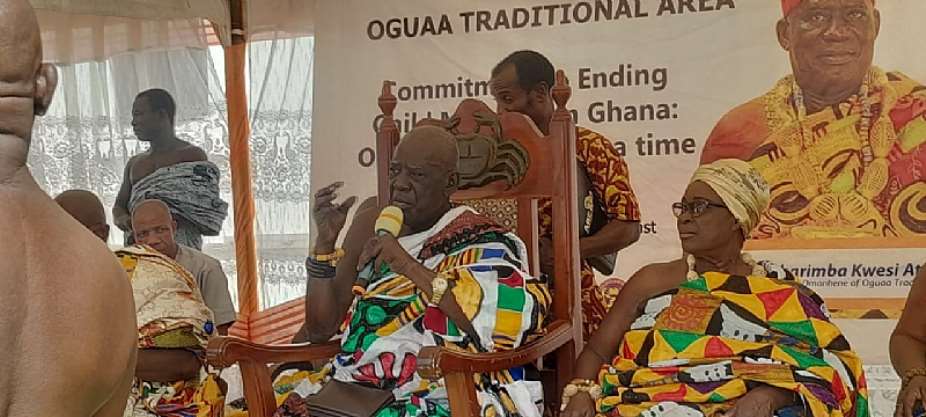The Oguaa Traditional Council has made an official declaration to end child marriage in Cape Coast with a stern warning to perpetrators of the crime.
The Council said it would fight the harmful menace through education, advocacy and legal and legitimate means, vowing that the resolution would remain valid until the objective had been achieved.
“We will ensure that any child who is below 18 years will not go into marriage and anybody who would act contrary to undermine the resolution will be in serious trouble with the Council,” Osabarimba Kwesi Atta II,” the Oguaamanhen cautioned.
He made the declaration at a durbar at his seat, the Emintsimadze Palace, to crown a three-day workshop for the Oguaa Traditional Council on ending child marriage in Ghana.

The workshop was organised by the Obaapa Development Foundation, an NGO focused on women development, with support from the UNFPA as part of efforts to empower traditional and religious leaders and the public to end child marriage.
Experts took the traditional leaders through the effects of child marriage and related issues, including sexually based violence, health complications, and legal provisions and sanctions.
The programme is scheduled to take place in three paramountcies, comprising Avatime, Oguaa and Akwamufie after which the traditional councils would put together an action plan.
Shortly after the declaration, Madam Halima Saadia Yakubu, the Chief Director of the Ministry of Chieftaincy and Religious Affairs, led members of the Council to take a pledge to fight all harmful practices against children and to create a community where every child could reach their full potential.

Osabarimba Kwesi Atta, alluding to the numerous dangers of child marriage, said they would work urgently in close collaboration with other stakeholders, including heads of schools, families, police, the Ghana Education Service and the Ghana Health Service to mitigate the menace.
He said it was wrong for parents to throw their pregnant girls out to stay with the men responsible, maintaining that such acts fuelled child marriage.
“Why should a child below 18 years move out to stay with a man?
“If they bring the pregnancy home, find legitimate means to deal with the situation but don’t support them to break the law,” he said.
“When they stay with these men, they can be abused or killed,” he added.
Osabarimba also bemoaned a growing trend of school girls giving their contacts out to hotels and other establishments to offer sex for money.
He stressed that child marriage was dangerous and if stakeholders acted indifferently, it might come back to haunt them.
The Executive Director of the Foundation and Development Queenmother of Afigya Kwabre in the Ashanti Region, Nanahemaa Adwoa Awindor, said the campaign had to be intensified to make people aware of their own contributions to the menace.
Citing teenage pregnancy as a major cause, she said many parents unconsciously pushed their girls into early marriage out of anger and frustration.
“Anytime we say early child marriage, we are thinking about a religion or a particular community.
“No, we are all encouraging child marriage and the earlier we brought people’s attention to it, the better,” she said.
She warned that any girl below 18 years old was fragile and susceptible to many health complications including fistula during childbirth.
Nanahemaa Awindor called for the strict implementation of national and international laws against child marriage and related offences.
Dr Wilfred Ochan, the Resident Representative, UNFPA, commended the Traditional Council for taking the bold decision to fight for the rights of young people.
He intimated that child marriage was a human rights violation which denied young people education, economic engagement, participation in governance, among other developmental activities.
He said child marriage remained a significant problem in Ghana, indicating that the prevalence of marriage by age 15 had stalled at about five per cent over the last 10 years, without any visible improvement.
“For us in UNFPA, no girl, absolutely none, should be married as a child.
“We aim at achieving zero gender-based violence and harmful practices including child marriage in every country,” he said.
GNA





 List of 24 ministerial nominees approved by Parliament
List of 24 ministerial nominees approved by Parliament
 You were my inspiration, made me who I am today – Lilian Kumah
You were my inspiration, made me who I am today – Lilian Kumah
 Rainstorm destroys Hohoe E.P. Senior High School building
Rainstorm destroys Hohoe E.P. Senior High School building
 John Kumah strongly supported me to become NPP flagbearer – Bawumia reveals
John Kumah strongly supported me to become NPP flagbearer – Bawumia reveals
 Late John Kumah urged me to run for NPP flagbearer, strongly supported me — Bawu...
Late John Kumah urged me to run for NPP flagbearer, strongly supported me — Bawu...
 Akufo-Addo appoints Joseph Kpemka as Deputy MD of BOST
Akufo-Addo appoints Joseph Kpemka as Deputy MD of BOST
 Ablakwa petitions CHRAJ to investigate sale of SSNIT's hotels to Rock City Hotel
Ablakwa petitions CHRAJ to investigate sale of SSNIT's hotels to Rock City Hotel
 MoF to provide new bailout for defunct Gold Coast Fund investors – Bawumia revea...
MoF to provide new bailout for defunct Gold Coast Fund investors – Bawumia revea...
 OMCs implement price adjustments despite International petroleum price declines
OMCs implement price adjustments despite International petroleum price declines
 Petition to remove Kissi Agyebeng will disrupt operations of OSP – Martin Kpebu
Petition to remove Kissi Agyebeng will disrupt operations of OSP – Martin Kpebu
